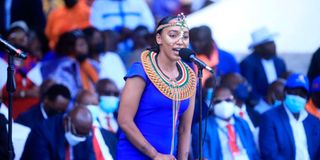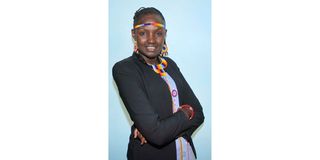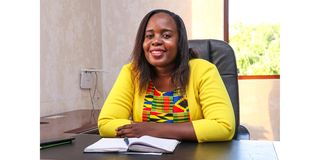The young and restless

These young aspirants have chosen leadership and courage despite gender and ageist stereotypes they face, and are running for office in some of the most competitive races.
What you need to know:
- When exercising their political rights, women face humiliation, sexualised jokes, insults, rumours about their private lives, and marginalisation.
- Today, a few women are making strides in both elected and non-elected offices.
- The August 9, election is likely to witness an interesting scenario, with young women increasingly launching their campaigns.
For decades, young women have not been keen on joining politics, and for genuine reasons.
When exercising their political rights, women often face humiliation, sexualised jokes, insults, rumours about their private lives, and marginalisation.
They also experience exclusion, constant interruptions in legislative debates, and have insufficient funding for their electoral campaigns.
It has, thus, been difficult for them to defend their interests at all levels of governance. Their influence on the decision-making process at the county and national government is limited.
The 2019 Population and Housing Census says 75 per cent of Kenya’s population is below 35 years of age, with the majority being women. However, for this particular demographic, the barriers to entry and progression in politics are immeasurable
Today, a few women are making strides in both elected and non-elected offices, though their political representation remains muted and unequal.
The August 9 election is likely to witness an interesting scenario, with young women increasingly launching their campaigns.
One such, Perpetua Mponjiwa, an MCA aspirant in Nairobi says the odds are always stacked against young women attempting to join politics.
“Women are socially conditioned to pursue a family as soon as they graduate from university. It is only after their children grow that they venture into politics.
Young women rarely envision politics as a career,’’ she tells nation.africa.
But the young ladies we feature today are raring to go. They have chosen leadership and courage despite gender and ageist stereotypes they face, and are running for office in some of the most competitive races.
Valentine Anyango, 22

Valentine Anyango, Kisumu County Woman Representative aspirant.
Marital status is not a leadership determinant, stop the bias
She has always been a leader from way back in primary school when she was a head girl and later became Miss Moi Suba Girls Secondary School.
When she joined the University of Nairobi in 2017 to pursue a Bachelor’s degree in Education, Ms Anyango got an opportunity to spearhead the Women Students Welfare Organisation.
“I have always been motivated to represent women and youths in different capacities, a desire that gave birth to my love for politics,” says Ms Anyango, who is vying for the Kisumu County woman representative seat.
She will be competing against former Kisumu deputy governor Ruth Odinga, former Kisumu city manager Doris Ombara, among other aspirants.
“I chose the woman rep position having in mind the people I want to represent, if elected. I will use the chance to represent the vulnerable.”
“We have always had older leaders, it is time we (the youth) grabbed the chance to make a difference,” she says.
Her political journey has, however, not been easy.
“Funding has been my major challenge. I use my savings to facilitate most of my work; my family and close friends also support whenever I seek their help,” says Ms Anyango.
“The people of Kisumu have showered me with love, always willing to give me a listening ear,” she says.
She is vying as an independent candidate after failing to raise Sh125,000 nomination fee required by her party of choice.
“Female youths do not have a level playing ground with the men and older women. The poor economic status makes it worse. Many want to vie but are left out because of lack of funds, among other challenges,” she says.
She has also encountered people who were quick to enquire whether she is married, and with children.
“The bias has to stop.
“Marital status should never be a leadership determinant, what matters is the ideologies and what we plan to do,” she says.
Ms Anyango looks forward to winning and initiating development programmes, including business incubation centres for youths.
“Do not wait until you are older and financially stable, just start with what you have and go with a courageous attitude,” she says.
Hezena Lemaletian, 31

Hezena Lemaletian is eyeing the Samburu County Woman Representative position.
Samburu County lacks effective representation
Hezena Lemaletian, 31, who graduated from the University of Nairobi in 2015, is a newcomer in politics. She is passionate about tackling issues facing vulnerable groups in Samburu County, the reason behind her joining politics.
“I will provide effective representation for vulnerable groups, including women, orphans and people living with disabilities. Effective representation of the groups is the one thing we currently lack in the county,” Ms Lemaletian said at a political rally in Maralal on March 8.
The youthful aspirant, aptly known as the queen of the north, says it was time for her as a visionary leader to be given the opportunity to bring positive change to the Samburu community. She is the reigning Miss Commonwealth Kenya.
Prior to making her political entrance, Ms Lemaletian had established herself in other areas, receiving recognitions and appointments.
She is the Global Peace, Culture and Charity Ambassador for the Commonwealth.
She is the founder of Pastoralists Sports Initiative that economically empowers the youth through sports and culture to create peace and cohesion.
She has vowed to give her rivals the political fight of their lives.
Ms Lemaletian has set her sights on education of girls and rehabilitation of street children if elected.
The outspoken activist became the first woman from pastoralists’ community to grace an international arena, when she spoke at the African Women Summit 2021 in Dubai, alongside Liberia’s Vice President Jewel Howard Taylor, whom she looks up to as her mentor.
Dr Josephine Kulea, 35

Dr Josephine Kulea, Samburu County woman representative aspirant.
Those in office have failed to protect Samburu girls
Dr Josephine Kulea, an anti-FGM campaigner in Samburu County, wants to represent the county as its woman MP. She says she wants to take the seat to tackle the rampant cases of early pregnancy, FGM and defilement among schoolchildren.
Speaking at a past event, the 35-year-old said she seeks to topple the incumbent Maison Leshoomo and “ensure that girls in Samburu County are protected and empowered.”
“We have the community’s backing our quest to clinch the seat. We have put in place strategies to increase votes as we go forward. Those in office have failed to protect our girls. Our daughters are exposed as prey, to old men out there,” Dr Kulea tells The Voice.
Prior to joining politics, she has been an anti-FGM campaigner through the Samburu Girls Foundation (SGF), an organisation she formed to rescue Samburu girls from early marriages, FGM and all manner of exploitation.
Among the projects she intends to pursue and implement are the establishment of multiple boreholes and water harvesting programmes to ease the burden on Samburu women who trek long distances in search of water.
“Having dams and boreholes will be a huge relief to our women. They endure difficulties getting water, an essential commodity,” says Dr Kulea, whose slogan is Mama mlezi (nurturing mother).
The race for the Samburu County woman representative seat has attracted four contestants.
Njeri Karanja, 32

Njeri Karanja, Thika Town MP aspirant.
Avoid making money a prerequisite for aspirants, or end up with bad leaders
The 32-year-old is vying for the Thika Town parliamentary seat.
Despite her father’s and friends’ reservations, the former banking officer, who resigned last month, tells The Voice that her conviction to run for the seat could not allow her to continue holding onto the lucrative job. She wants to bring the much-needed change in the constituency, and can only do it well in Parliament.
Ms Karanja, who is finalising her doctorate in Finance at the University of Nairobi, says she wants to come up with laws that will reduce the burden for traders and manufacturers in Thika, if elected.
“As a finance specialist, I will seek to make the business environment friendlier by outlawing double taxation and multiple licensing for traders, and lower power tariffs. We have to deal with all aspects that make the cost of doing business high to attract more investors and create jobs for the youth,” she says.
Also on top of her agenda is raising the dwindling education standards in the constituency through lobbying for more government teachers and building more classrooms.
“I will also initiate role modelling and mentorship for pupils, students and teachers. I seek to partner with the old boys and girls in all the schools to undertake the mentorship programme,” she says.
Her plan for the youth, she says, includes the formation of a kitty to support those talented in music and art, among others, but lack capital.
Ms Karanja, who is vying for the seat on the Chama cha Kazi ticket, says massive resources needed to mount a serious campaign is among the challenges youthful aspirants face.
She appeals to constituents not to put money as a prerequisite for those vying for political seats as they could end up shunning good leaders that the country badly needs.
Although she has not been physically harmed, she fears for her security while campaigning. Some members of her security team have been attacked twice.
Her message to locals and Kenyans is to embrace women leadership. She appeals to women to back female aspirants by supporting and voting for them. Ms Karanja will be battling it out with five other hopefuls.
Cynthia Muge, 29

Kilibwon Member of County Assembly Cynthia Muge. She is vying for Nandi County woman representative seat.
I was a jobless graduate, I joined politics to bring change
She debuted in politics in 2017 at the age of 24, becoming the youngest MCA in the country after winning the Kilibwoni Ward seat as an independent candidate.
Ms Muge, commonly known as Cheptikonyal, has gained traction among the youthful generation since she launched her bid.
“My scorecard is pegged on the development record while serving as an MCA. The electorate have confidence in me, and would elect me based on the empowerment policies targeting youth and women that I introduced,” she says.
Ms Muge says she never thought of throwing her hat into the political ring until three days after graduating from University of Nairobi in 2016. She then announced her bid to contest the Kilibwoni Ward.
She tells nation.africa that there were no jobs after she graduated, and she ended up declaring her political bid.
“I did not consult anyone. I just felt I should become a leader and represent the interests for the youth and articulate critical issues in the community,” she says.
It was at a fundraiser event held in Kapsabet town where Ms Muge rose and took the microphone, to the astonishment of the congregants, and broke the news on her bid; many did not take her seriously.
She had no financial support to register her candidacy with her party of choice, and so she vied as an independent candidate. There were more than 20 male contestants who were independent candidates.
Ms Muge says countering Jubilee campaigns that were intensified by President Uhuru Kenyatta and Deputy President William Ruto during their election campaigns, was herculean.
“They maintained that Nandi was a Jubilee zone and people should only elect Jubilee aspirants. But people defied the party’s influence and voted for me,” she explains, noting that her ideas and manifesto resonated despite being unmarried then.
The alumna of Moi Girls High School, Isinya, says her passion has always been to articulate socio-economic issues touching on women and the youth. She sponsored a bill that introduced an empowerment programme dubbed Nandi Youth Service (NYS) that has created employment to more than 700 youths.
“The servicemen [and servicewomen] are recruited annually, and go through intense training in masonry, roads renovation, among others,” she states.
Irene Nyambura, 31

Irene Nyambura, Kiambu County Senate aspirant.
Nobody is speaking the language of the youth
The 31-year-old says she was so upset by her lecturer’s gaffe that she decided to take on the administration over the matter.
“That incident shaped the person I have become—the voice of the voiceless. It inculcated in me the political traits and helped to grow my passion to champion the rights of the vulnerable,” she says.
Ms Nyambura has declared her candidature for the Kiambu County senatorial seat as an independent candidate. The Political Science and Psychology graduate will battle it out with seven other aspirants.
“If elected, I will ensure the county gets more fund allocation from the national government; something commensurate with its population,” says Ms Nyambura, who also holds a postgraduate diploma in armed conflict.
She notes that providing the requisite oversight of the county administration to ensure funds are well utilised will be her major objective.
“What I am asking the young voters is to give me a chance. I am one of their own and, therefore, have their best interests at heart. To the elderly who happen to be my parents, I am also seeking their support as their child,” she says.
Ms Nyambura is banking on her involvement with the youth, women and persons living with disabilities through the Jitambue Initiative, which she founded in 2013.
She says she plunged into politics at a young age to ensure the voice of the youth is heard.
“The young people have been sidelined in matters of leadership and beyond. Nobody is speaking our language. It is high time we showed the young people that it is possible,” she says.
While appealing to Kiambu residents to elect women, she tells the youth not to fear venturing into politics, saying it is the only way they will make their voices heard.
Ms Nyambura is no stranger to politics having been involved in Jubilee Party presidential campaigns in 2017.
Norah Bosibori, 32

Norah Bosibori, Dagoretti North MP aspirant.
Young women are not even expected to be leaders
Norah Bosibori is vying for the Dagoretti North constituency Member of Parliament (MP) seat. Her mission is to change the negative narrative associated with Dagoretti youth.
“The youth in our constituency are heavily associated with crime. I want to change this by empowering them economically and socially,” Ms Bosibori says.
The 32-year-old grew up in a volatile region characterised by inter-border conflict between pastoralists and agricultural communities.
“Conflict was part and parcel of my childhood. This hampered development efforts and access to basic needs such as education and healthcare,’’ she says.
Her childhood experience informed her decision to join politics to champion social change and development. Moreover, she has spent most of her working life as an academic, having lectured IT and Cyber Security Studies in various institutions of higher learning across the country.
She holds a Bachelor’s degree in Business Information Technology, a Master’s in Information Technology, Security and Audit, and is currently pursuing her doctoral studies in data privacy at the University of Witwatersrand.
Her childhood experiences, coupled with her work in academia, are her biggest drivers for vying for the MP seat.
“I realised youths and women are marginalised during community engagement. I decided that the most effective way to empower them is to become a law and policymaker,” Ms Bosibori says.
The IT specialist, whose campaign tag is Kazi kwa Mpigo (hard work), has a comprehensive development plan that centres around women and the youth.
She intends to decentralise the Big Four Agenda to her constituency. Her focus areas include healthcare, education, security and promoting a clean and healthy environment. The aspirant opines that the public education system in the constituency is in dire straits.
“I am a beneficiary of public schools. However, most public schools in Dagoretti North cannot offer quality education because they are underfunded and run-down,” she says.
Although Ms Bosibori has flamboyant aspirations for her constituents, she opines that patriarchal values even from her own community, have been challenging.
“Most young women are not even expected to be leaders because patriarchy limits our roles to the kitchen,” she says.
Ms Bosibori, who playfully describes herself as ‘Bosi wa Dago’, believes her candidature is proof of young women’s courage and capacity to contend and win elective politics.
Maryam Abubakar, 30

Maryam Abubakar, Lamu County woman representative aspirant.
My dream is to have Lamu residents fully empowered
“I was born in the Mkomani area of Lamu Island 30 years ago. I went to Mkomani Primary School in Lamu Old Town before joining Loreto Girls High School in Limuru.
“I have a degree in accounts from Moi University and currently pursuing a master’s in strategic management at the University of Nairobi.
“I run a company, Myra Botanics, which deals in fashion and cosmetics. I also hold mentorship programmes for young boys and girls in Lamu. I also hold women and youth empowerment programmes and charities.
“Because of that, I am vying for the Lamu woman representative seat in the August 9 General Election on a United Democratic Alliance party ticket. I am confident of winning. A victory will allow me to do more charity work.
“My vision is to have women, youth, and people living with disabilities fully empowered. My mission is to create employment for the youth and women in Lamu County.
“My dream is to see our people informed and empowered. This is not the first time I am running for the seat in Lamu County. I did the same in the 2017 election but lost to Ruweida Obbo.
“I believe in myself. I have the leadership qualities that the people of Lamu deserve.
“I hope the people of Lamu will elect me this time round. I have many goodies for them. The only thing I urge is for them to have confidence in me.”
Carolyne Andadzi Chilango, 36

Carolyne Andadzi Chilango, Kilifi Senator aspirant.
Parties should financially support women with limited resources
The advocate of the High Court of Kenya was the first legal advisor for the Kilifi County Government after the 2013 General Election. She later resigned and joined politics, vying unsuccessfully for the Kilifi Senate seat. The 36-year-old will be in the race for a second time.
She is the only woman who has declared interest in the seat and will be battling to upset Stewart Madzayo, who will be defending his position. Ms Chilango tells nation.africa that she wants to fight for the interest of Kilifi people through effective legislation, if elected.
“Because of my experience at the county government, I thought I should go for the seat to ensure effective oversight, and safeguard our resources. I will ensure that funds go to priority projects,” she says.
Ms Chilango adds that the people of Kilifi had hoped the devolved unit would initiate development in priority areas like education, agriculture, water, and health.
“Devolution presented a new experience, and we expected our county to grow in infrastructure and development,” she says, acknowledging that the challenge has been in the budget-making process.
“It is done hurriedly and by the time members of the public realise, it is ongoing or in some instances, it has elapsed, and the budget is already approved,” she says.
The advocate says she witnessed many things while working for the county that need to be rectified if the county is to grow.
“There was misappropriation of public funds, corruption, and embezzlement,” she says.
The Matuga Girls High School alumna says she ended up becoming a lawyer because the church supported her.
“My father could not afford to take me to university. I went to church and pleaded with the pastor to help me raise university fees. He called a fundraiser, and I got school fees. And so, no child will miss school because of their circumstances or background if I’m elected.”
Ms Chilango cites insecurity and lack of funds as hindrances to women’s political ambition. She says the political environment is hostile to women and a majority undergo physical and emotional torture. “When a woman is vying, the public wants to know irrelevant finer details about her,” she says.
Ms Chilango wants political parties to invest in more women. “Political parties should financially support and empower women with limited resources to attain their political goals and for the country to attain the two-third gender rule,” she adds.
She urges the electorate to elect many women in the August 9 General Election. “It is not about being male or female. The common citizen is interested in the development agenda, not the gender agenda,” she adds.
Story by Kalume Kazungu, Agatha Gichana, Kamau Maichuhie, Angeline Ochieng’, Geoffrey Ondieki, Tom Matoke and Maureen Ongala
[email protected], [email protected], [email protected], [email protected], [email protected], [email protected]




